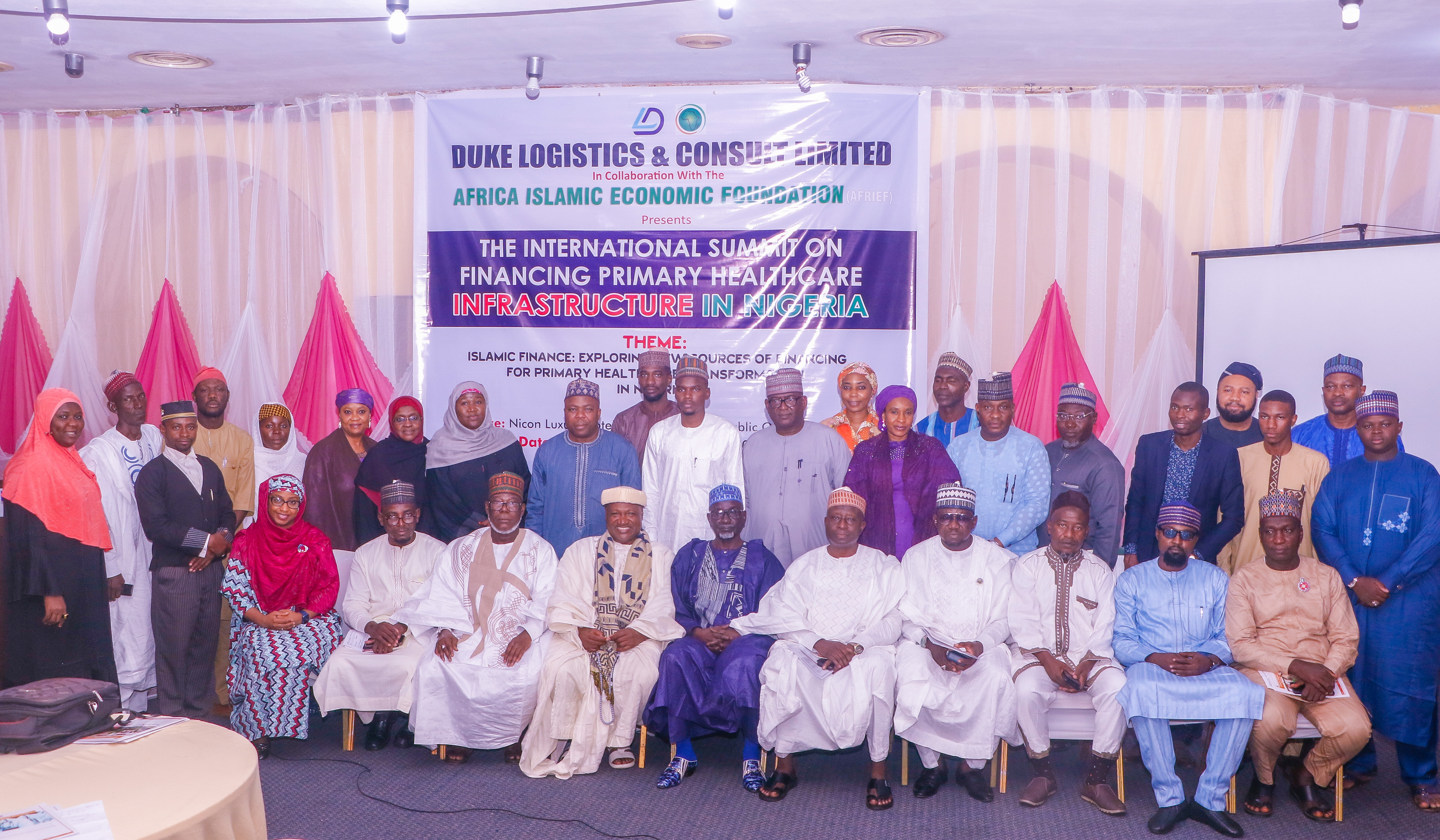By our special correspondent
A one-day international Summit on Financing Primary Healthcare Infrastructure in Nigeria under the theme: Islamic Finance: Exploring New Sources Of Financing For Primary Healthcare Transformation in Nigeria was held in Abuja, the Capital of the Federal Republic of Nigeria on the 30th of November, 2023, at the NICON Luxury Hotel, under the distinguished Chairmanship of His Excellency, Senator Ibrahim Shekarau, former Executive Governor of Kano State.
The groundbreaking event, which was organized by DUKE Logistics & Consult (Nigeria) Limited, Abuja, in strategic collaboration with the Africa Islamic Economic Foundation, Ghana and Glocal Healthcare Services Limited, India, was held to explore innovative healthcare financing models that leverage Islamic finance instruments such as sukuk (Islamic bonds), waqf (endowments), and takaful (Islamic insurance), etc. in providing sustainable and long-term financing for primary healthcare transformation in Nigeria; and to foster collaboration between the various states of the federation to share best practices and experiences in leveraging Islamic finance for healthcare projects.
The summit featured keynote speeches and discussions on various topics related to Islamic finance, healthcare infrastructure development and digital health solutions: The role of Islamic Finance in healthcare Infrastructure Development in Nigeria, by Prof. Ahmad bello Dogarawa of the Ahmadu Bello University, Zaria; Digital Health Solutions Innovation: The Glocal Story, by Mr Shailesh Kumar, of the Glocal Healthcare Systems Limited, India; Digital Health Transformation: Opportunities & Challenges, by Hon Dr Abdel Majeed Haroun, former Minister of Agriculture, Republic of Ghana; Africa Healthcare Infrastructure Program (AHIDEP), by Hajiya Aishatu Usman Muhammad of the Gombe State University, Gombe, The foregoing presentations were supported with expert and insightful discussions by Dr Aisha Ahmed, an Islamic Finance expert and consultant, Abuja and Mr. Muhammad Lawal Shu’aibu, CEO, LCM Consult Limited Abuja.
One of the key discussions revolved around the role of Islamic Finance in healthcare infrastructure development in Nigeria. Participants delved into the potential of Islamic Finance to provide sustainable funding for the construction and maintenance of healthcare facilities. This topic explored innovative financing models that align with the principles of Islamic Finance, such as waqf (endowment) and sukuk (Islamic bonds).
Another captivating topic discussed at the summit was “Digital Health Solutions Innovation: The Glocal Story.” The term “Glocal” refers to the combination of global and local perspectives. The Summit focused on the Glocal Story, which highlighted its cutting-edge digital health solutions that bridge the gap between global advancements and local healthcare needs. Experts shared success stories, case studies, and best practices, showcasing how technology can revolutionize healthcare delivery in Nigeria by improving access, affordability, and quality of care.
Furthermore, the summit covered the topic of “Digital Health Transformation: Opportunities and Challenges.” This presentation highlighted the importance of adapting digital health solutions to the specific needs and contexts of Nigeria. It addressed how these innovations can improve healthcare accessibility, efficiency, and quality, particularly in underserved areas. Participants explored the potential benefits and challenges associated with digital health transformation in Nigeria. They examined how technological advancements, such as telemedicine, electronic health records, and artificial intelligence, can revolutionize healthcare delivery and management in the country.
The presentation of the Africa Healthcare Infrastructure Development Program, the flagship initiative of the Africa Islamic Economic Foundation, offered participants a glimpse of the functions of the Program. The presentation shows that AHIDEP is a great platform to connect with international organizations and investors who are interested in supporting healthcare initiatives in Nigeria. However, to showcase the importance and potential of a healthcare project to potential investors, potential beneficiaries would have to prepare a comprehensive proposal outlining their healthcare infrastructure development goals, strategies, and the potential impact.
The discussions also touched upon the importance of involving stakeholders and ensuring efficient management of healthcare infrastructure projects. Furthermore, the discussions elucidated in detail how Islamic finance can support the innovation and implementation of digital health solutions tailored to the Nigerian context. The conversation revolved around leveraging technologies like telemedicine, mobile health applications, and electronic health records to enhance access to healthcare services, especially in remote areas. The importance of collaborations between local and international stakeholders for effective digital health transformation was also emphasized.
Overall, this one-day event, the international summit on financing primary healthcare infrastructure in Nigeria provided a platform for experts, policymakers, and stakeholders to discuss strategies and explore new sources of financing for primary healthcare transformation in Nigeria. It showcased the potential of Islamic Finance as a viable option and emphasized the importance of digital health solutions in shaping the future of healthcare in the country.





 TRENDING11 months ago
TRENDING11 months ago
 PROFILE8 months ago
PROFILE8 months ago
 BUSINESS & ECONOMY3 years ago
BUSINESS & ECONOMY3 years ago
 BUSINESS & ECONOMY3 years ago
BUSINESS & ECONOMY3 years ago
 BUSINESS & ECONOMY3 years ago
BUSINESS & ECONOMY3 years ago
 HALAL ECONOMY10 months ago
HALAL ECONOMY10 months ago
 BUSINESS & ECONOMY3 years ago
BUSINESS & ECONOMY3 years ago
 BUSINESS & ECONOMY2 years ago
BUSINESS & ECONOMY2 years ago



